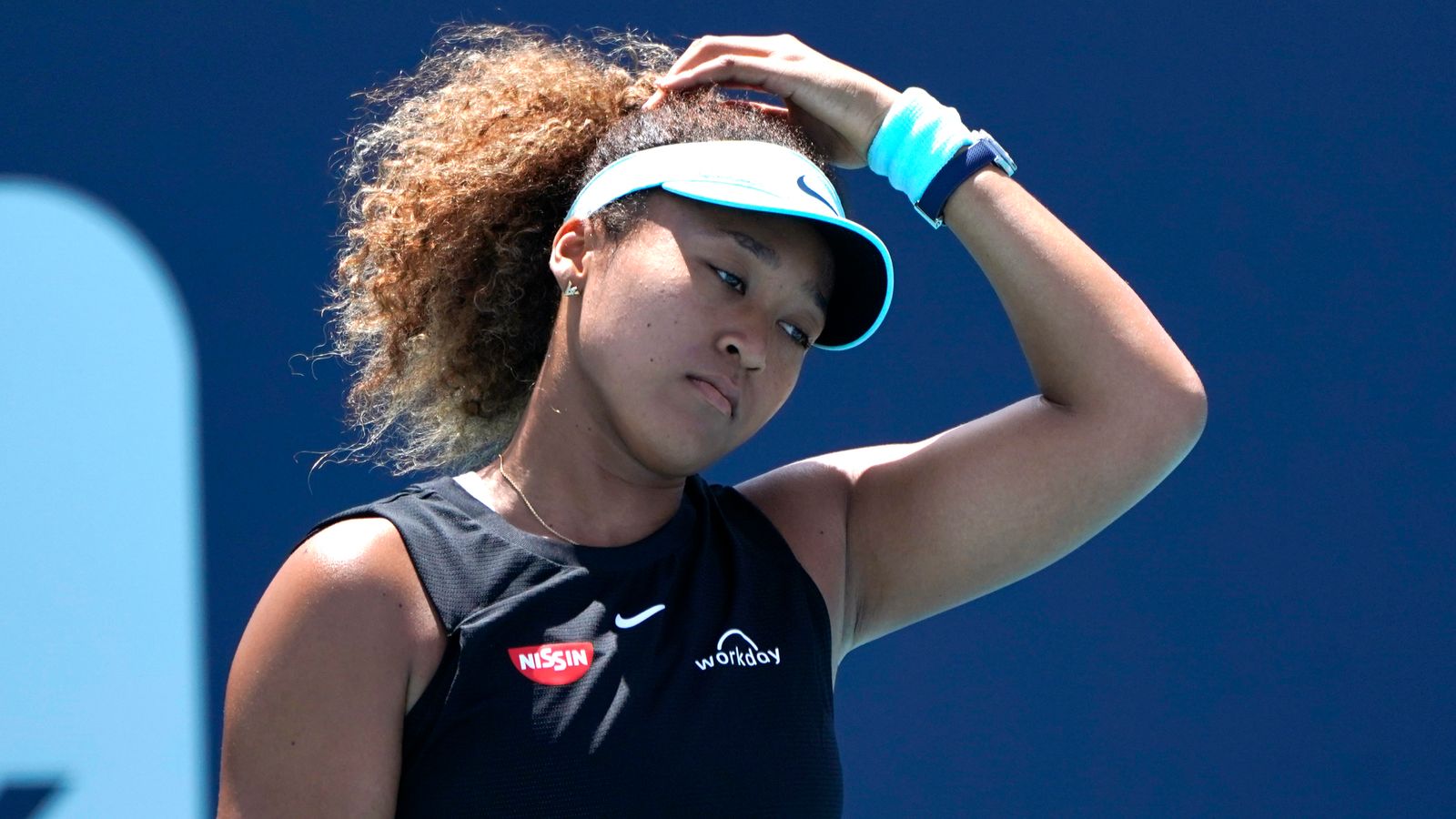Tennis star Naomi Osaka has pulled out of the French Open due to concerns for her mental health – but she is not the first professional athlete to suffer.
The world number two was told by organisers she would be thrown out if she kept avoiding journalists, so the four-time Grand Slam singles champion, has now withdrawn.
The pressures of top-level sport have affected a number of high-profile sports personalities.
Here, we take a look at some of the athletes who have opened up about their struggles.
Joe Marler
The Harlequins and England prop was the subject of Sky Sports documentary Big Boys Don’t Cry in which he talked candidly about learning to cope with his mental health issues.
“I met a psychiatrist, got an evaluation, had several sessions with him and was put on anti-depressants,” he told Sky Sports News.
“I opened up to my wife, I opened up to my close friends, to get help from them and a bit more understanding of what was going on.
“We are required to dominate and intimidate opposing players when we cross the white line on the pitch, we must show no weakness or vulnerability in order to win.
“But it doesn’t have to be like that off the pitch.”
Andre Agassi
The former world number one tennis player sent shockwaves around the sporting world after he released his autobiography Open, documenting his use of crystal meth following a life of feeling pressured into being the best.
Agassi revealed his father had pushed him into pursuing tennis at the age of 13, by enrolling him in a tennis boarding school.
Serena Williams
After losing the 2006 Australian Open title, tennis powerhouse Williams blamed lack of fitness and a knee injury for keeping her off the court. She, however, later revealed in her autobiography she had been suffering from depression, along with her injuries.
She stayed away from professional tennis for six months and saw a therapist in a bid to help her return to the sport.
Williams has also spoken about her struggles with dealing with postnatal depression after the birth of her daughter.
Please use Chrome browser for a more accessible video player
“I think people have to talk about it more because it’s almost like the fourth trimester, it’s part of the pregnancy,” she said.
Andrew Flintoff
Cricket star and TV presenter Andrew “Freddie” Flintoff has admitted to a career-long struggle with bulimia.
In the documentary, Freddie Flintoff: Living With Bulimia, the former England captain said he had suffered from the eating disorder since being shamed for his appearance by the British press at the start of his international career.
The 42-year-old star, a host of Top Gear and team captain on comedy panel show A League Of Their Own, said his struggle with the illness had continued beyond his playing career, and that he had made himself sick after eating as recently as in the past 18 months.
Marcus Trescothick
Fellow England cricketer, Marcus Trescothick cut short his tour of India in 2006, initially claiming he was suffering from a virus. He later revealed he had been having anxiety attacks ever since he was 10 years old.
While Trescothick returned to country cricket afterwards, his constant battles with his mental health led him to announce early retirement from international cricket in 2008. He has documented his struggles in his autobiography, Coming Back To Me.
Jonny Wilkinson
Legendary rugby international Wilkinson spoke honestly about his struggles to the Express newspaper.
The World Cup winner, former captain of the best club team in Europe and rugby icon, said on one occasion while waiting to go on to the pitch to play for Toulon he locked himself in the toilet.
“The team was outside in a huddle waiting for me. I was supposed to be giving the ‘come on we can do this’ speech and I was a shivering wreck in the toilet.”
Wilkinson, who kicked the winning drop goal in England’s historic World Cup win back in 2003, added: “I had mental health stuff throughout my entire life.
“I had times when I’d be speaking to my family before England games from the team hotel where I was inches away from going to tell the coach I couldn’t play. Make up an excuse not to.
“That was the state I was in. It was pure panic. Chaos.”
Ian Thorpe
The five-time Olympic gold medallist and retired swimmer first publicly admitted to suffering from mental health problems in 2012.
Thorpe, who won four golds as a teenager at the 1998 Commonwealth Games, spoke about battling depression and alcohol addiction, contemplating suicide and trying to deal with being a teenage swimming prodigy.
In 2006, he announced his retirement from swimming, saying he had no motivation to compete. He then made a comeback and tried to qualify for the 2012 Olympics, but did not succeed.
Two years later, he was admitted to a rehabilitation centre and sought help for his issues.
Ricky Hatton
The multiple world title champion said he had tried to kill himself “several times”.
The boxer opened up about the mental health issues he has suffered since retiring from boxing, saying he has struggled to cope with the void that was left in his life.
Frank Bruno
Fellow British boxer Bruno has struggled with depression and bipolar disorder for years and said it pushed him “to the brink” at times.
He was taken from his Essex home in 2003 by medical staff assisted by police officers and sectioned (receiving hospital inpatient mental health support) under the Mental Health Act.
He said: “Being sectioned was the best thing that ever happened to me.
“Getting put in hospital meant I could stop, get myself sorted and come back stronger.”
Danny Rose
England and Tottenham star Rose opened up about his life as a professional footballer – going as far as to say he would not recommend it to children.
Following a difficult 2017-18 season, the left-back revealed he had been diagnosed with depression, caused by injury and family tragedy.
He told Sky Sports News: “Friends were asking me to do things. I wouldn’t want to go out and I would come home and go straight to bed.”
The Heads Up campaign was launched in professional football, spearheaded by Prince William, to improve the wellbeing of players.
The Duke of Cambridge said: “Through the Heads Up campaign, the football community has come together to do its part in driving lasting change by encouraging people to open up about their mental wellbeing, at the same time as embedding a mentally healthy culture across the sport.
“I believe there is more we can do collectively to ensure this is replicated across all of sport.”
Anyone feeling emotionally distressed or suicidal can call Samaritans for help on 116 123 or email [email protected] in the UK. In the US, call the Samaritans branch in your area or 1 (800) 273-TALK






















